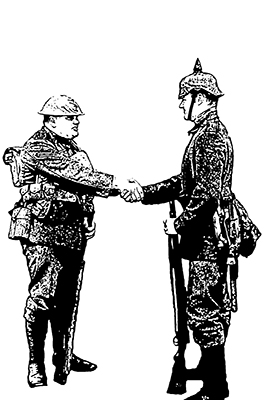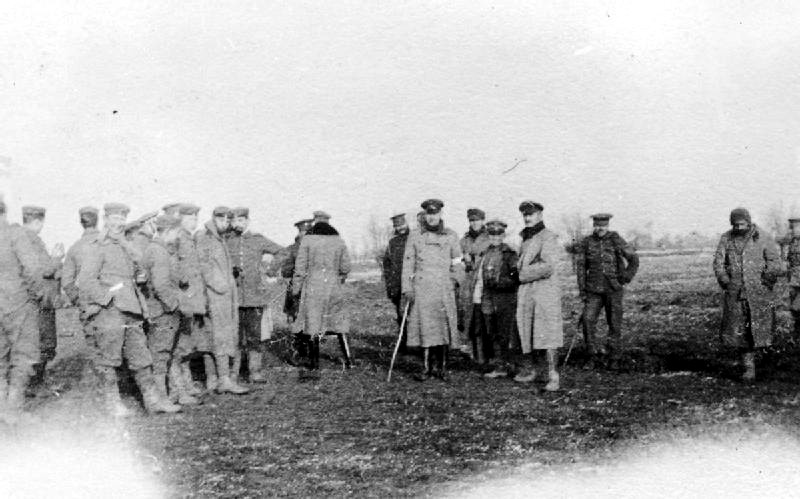It was the war that was meant to be over by Christmas. In 1914, 5 months into WWI an end was far from in sight. However, on 24th December an unofficial temporary truce was agreed along the Western Front. Soldiers from opposing sides laid down their guns and celebrated Christmas together.
This year, possibly more than ever, the Christmas truce of 1914 has struck a chord with the nation. Featuring on TV adverts, being widely talked about in the press, even a memorial statue for the much debated game of football in Flanders Field, Belgium, was unveiled earlier this month by Michel Platini, president of UEFA.
What happened on that day has become one of the most famous and mythologised events of the war. With stories of carols, swapping of treasured items and, of course, the famous game of football between the British and the Germans, it has become a wonderful example of humanity. Whilst we may not be able to piece together an exact account of what happened on this momentous day, we do have a clear idea of specific events that make the Christmas Truce of 1914 one of the most heart-warming stories in British History.
Late on Christmas Eve 1914, following the first air raid in British History after a German aeroplane dropped a bomb on the town of Dover, the British Infantry were astonished to see Christmas trees and paper lanterns lining the German trenches. Carols were sung and eventual communication between both sides began.
Whilst ‘Silent Night’ has become synonymous with the Christmas Truce, soldiers have documented in letters home that it was in fact ‘O Come All Ye Faithful’ that encouraged both sides began to sing in harmony.
Whilst a truce was largely observed, not all of the Western Front adhered, fighting was ongoing in certain areas and deaths were recorded on Christmas Day. Soldier Pat Collard, for instance, wrote to his parents, describing a horrendous Christmas under fire, concluding: “Perhaps you read of the conversation on Christmas Day between us and the Germans. It’s all lies. The sniping went on just the same; in fact, our captain was wounded, so don’t believe what you see in the papers.”
At first light on Christmas Day, a number of German soldiers emerged from their trenches and began to approach their enemies calling out ‘Merry Christmas’ in their native tongue. Wary that this could be a trick, the British stayed in their trenches. Soon realising their enemies were unarmed they climbed out of their trenches to join them halfway in No Man’s Land to exchange handshakes.
Rifleman J. Reading, writing to his wife about the truce confirmed some of the heart-warming events we remember today. “During the early part of the morning the Germans started singing and shouting, all in good English. They shouted out: “Are you the Rifle Brigade; have you a spare bottle; if so we will come half way and you come the other half.” At 4 a.m part of their band played some Christmas carols and “God save the King”, and “Home Sweet Home.” You could guess our feelings. Later on in the day they came towards us, and our chaps went out to meet them. Of course neither of us had any rifles. I shook hands with some of them, and they gave us cigarettes and cigars.”
During the festivities of the truce, there were more sobering events also taking place. Soldiers used the ceasefire to retrieve the bodies of their fallen comrades. J. Reading’s letter continued “We did not fire that day, and everything was so quiet that it seemed like a dream. We took advantage of the quiet day and brought our dead in.” As a result of the truce, some soldiers were laid to rest in No Man’s Land side by side with their opposition in joint burials.
Although it is one of the most significant stories of the truce, there is no hard evidence to suggest the football match between battlefield enemies went ahead as reported as there is no official account that mentions it. Research suggests the British played football amongst themselves as the Germans watched on. This letter, sent by Mr J. A. Farrell, a Bolton Post Office employee, indicates there was no German involvement in the game. The letter that was sent to the Post Office, published in the Bolton Chronicle 2nd January 1915, reads: ‘…In the afternoon there was a football match played beyond the trenches, right in full view of the enemy’…”
A letter sent home to a father from his son on the Front Line was relayed in the Rugby Advertiser on January 16th 1915 indicating that although there was a hope of such a game, the plans fell through.
“Walter Cooke, son of Mr H Cooke of Church Lawford has written home to thank his friends for the plum pudding and good things they sent him for Christmas. He says: ‘They wanted to play at football but that fell through. They kept their word, and did not fire a shot all Christmas Day and Boxing Day’.”
As the war continued, the truce was never repeated. The following year, the threat of disciplinary action by the officers was enough to stop any further attempts of a cease fire on Christmas Day. However, that year soldiers on the Western Front did not expect to celebrate Christmas on the battlefield, but even a world war could not destroy the Christmas spirit.
Find out more about WWI with our great choice of Battlefield tours.

